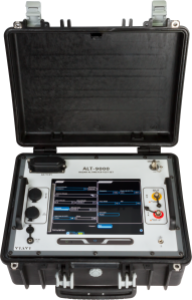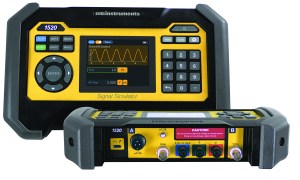Test and equipment makers for the aviation industry continue to evolve as they need to address new technologies and safety concerns, as well as increasing demand for ease of use in the field, while maintaining legacy systems. In addition, portable instrument makers also need to address ease-of-use issues, battery life, and software upgradability. Here are two recent product launches that tackle these challenges.
Viavi Solutions Inc. has launched the ALT-9000 universal radio altimeter (RADALT) flight-line test set, enabling manufacturers to test all types of RADALTs. As manufacturers develop radio altimeters with more sophisticated waveforms to address safety and security issues in the aviation industry, the portable, battery-operated ALT-9000 test set adds fiber-optic delay to traditional radio frequency (RF) testing, said the company.

Viavi ALT-9000 RADALT flight-line test set. Click for a larger image. (Image: Viavi Solutions Inc. )
RADALTs, which measure an aircraft’s altitude above the terrain by transmitting a RF signal down to the ground and receiving a reflection, are using more complex waveforms to prevent potential spoofing or jamming of the return signal, said Viavi. In addition, older RADALTs may lack the required interference protection as 5G networks start to use C-band frequencies, added the company.
The ALT-9000 uses fiber-optic delay, which allows it to work with all types of radio altimeters. It tests the complete RADALT system, enabling the operator to isolate a problem to the antenna, coaxial cable, line-replaceable unit (LRU) or indicator. This eliminates unnecessary swaps or replacements of system components, said Viavi.
The radio altimeter test set performs complete closed-loop system tests, replicates in-flight conditions, and creates profiles for dynamic altitude simulations, enabling more frequent testing of flight systems, which reduces the cost of takeoff failures, said the company.
The ALT-9000 provides altitude simulations with true RF time delay and path loss models to test any radio altimeter type including low probability of intercept (LPI), combined altitude radar altimeter (CARA), and next-generation variants. It simulates altitudes from 0 ft (minimum simulated altitude depends on AID and test cable length) to 10,000 ft. in 10-ft. steps.
Another recently introduced portable test instrument is MTI Instruments’ Wi-Fi-enabled 1520 portable simulator and calibrator with enhanced functionality. Designed to test and calibrate sensor-driven aviation systems, the 1520 signal simulator and calibrator is said to bring laboratory-grade accuracy into the flight line and test cell.

MTI Instruments 1520 signal simulator and calibrator. Click for a larger image. (Image: MTI Instruments)
The rugged instrument extends operation in the field with up to 10 hours of battery life, while the Wi-Fi capability eliminates the need for a second technician to conduct troubleshooting and diagnostics. It also features a two-handed controller for glove-friendly operation and a color touchscreen for viewing high-precision graphical waveforms.
In addition to the Wi-Fi capability, long battery life, and ergonomic design, the 1520 features additional functionality compared with MTI Instruments’ existing handheld 1510A signal simulator. One of the key features is high-precision waveforms. The device provides custom, sine, square, triangle, pulse, tachometer and sawtooth waveforms from 0.1 Hz to 100 kHz in 0.1 Hz-increments. It also delivers bridge circuit simulation and comes with a NIST-traceable certification. It also is field-upgradable, supporting software updates and additional sensors and features.
The upgraded features target jet maintenance technicians that use portable signal simulator and calibrator instruments. The 1520 is suited for use with MTI’s jet engine test equipment, including the recently introduced PBS eXpress portable engine balancing system.
Advertisement





